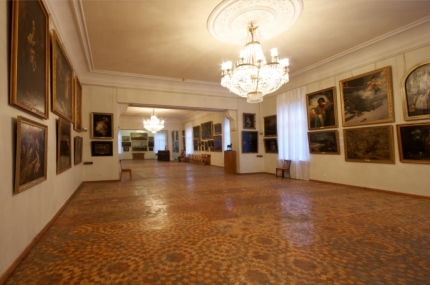
Russian Occupiers Looting Crimean Museums
Russian Occupiers Looting Crimean Museums
A Ukrainian parliamentarian has called for the United Nations to intervene and stop the looting of museums in Crimea by the Russian occupation authorities, an action that he says raises the specter of a broader effort by Moscow to change the cultural and ethnic face of the peninsula. Such actions, he notes, are in violation of international law, including the UN Convention on Genocide, which prohibits such actions.
Volodomyr Aryev, a Verkhovna Rada (national parliament) deputy of the Bakitvshchina (Fatherland) faction, said that according to the information he has, Russian occupation authorities “are carrying away pictures from the museums of Crimea to the museums of Russia,” and to the Hermitage of St. Petersburg in the first instance. “We hold that this marks the beginning of the mass export of cultural and historical values and artistic subjects” (nr2.ru/kiev/490876.html).
Given past history, Aryev said he is especially concerned about what this will mean for the future of Crimea. “This is not the first theft by the occupiers! The entire history of Moscow began with theft! The son of the founder of Moscow, Andrey Bogolyubsky, stole the Vysgorod icon of the Mother of God and carried it off to the city of Vladimir. This was the first such theft. Peter I continued the theft. They stole our land! Our culture! Now they are stealing the Crimea from us! But we will get everything back! Everything from the Vyshegorod icon on [because] right is on our side.”
The Ukrainian parliamentarian said that the Verkhovna Rada must appeal to international organizations, including UNESCO, to prevent further Russian thefts and to begin the process of recovering what has already been taken.
While the mounting human losses in Crimea and the threat that the Russians may begin a “soft deportation” of Crimean Tatars who refuse to take Russian Federation citizenship represent far greater crimes, history suggests that attacks on and thefts of cultural objects often have an impact on the course of events far greater than anyone might expect.
The Parthenon friezes carried off by the British and now known as the Elgin marbles in the British Museum still constitute a major issue in British-Greek relations. The Taliban’s destruction of Buddhist statuary outraged the world often to a far greater degree than did any other actions of the Afghan Islamist regime. Art thefts across Europe is the subject of a new Hollywood movie, “The Monuments Men,” and Soviet theft of precious items from churches and private collections, as well as Moscow’s unwillingness to seek recovery of them or to compensate their former owners, still constitutes a major rift in Russian society.
A major reason for this anger is that such actions can be said to fall under the provisions of the UN Convention on Genocide, which describes the destruction or theft of cultural valuables of a people as one of the characteristics of an effort to wipe out a people or culture and which therefore proscribes such actions.
As has sometimes been the case elsewhere and at least so far appears to be the case in Crime, the specific acts that some view as genocidal can in fact be considered as actions intended to protect priceless artefacts. In the view of the British, for example, the Elgin marbles exist today only because they were taken to London. Had they been left in Athens, pollution in the Greek capital might very well have eroded them to the point of unrecognizability. That does not justify or make such actions the right thing to do, but it does suggest that whatever the Russians have done in Crimea so far or may do in the future is likely to be the subject of intense dispute.
Indeed, it is likely that at least some of the art that the Russian occupation authorities have taken was moved to the museums of St. Petersburg or other cities not so much as war trophies but in order to protect such objects from the damages they might have suffered should fighting break out between occupiers and the occupied. It is worth noting that in many places, if not in Crimea, Russian art historians have been at the forefront of international efforts to protect art objects from destruction or theft.
Having said that, however, it is a fact that the unilateral seizure and removal of such art is a crime, that the international community must insist on a full inventory and accounting of what has been taken and where, and that the Russian side must return these valuables to Crimea as soon as possible. Failure of the international community to make such demands in this case would be a serious dereliction of duty; and the failure of the Russian Federation to meet them would almost certainly mean that, in the eyes of the people of Crimea, Ukraine and others as well, the Russian actions would fall under the terms of the UN convention and further exacerbate relations between Moscow and the West.


